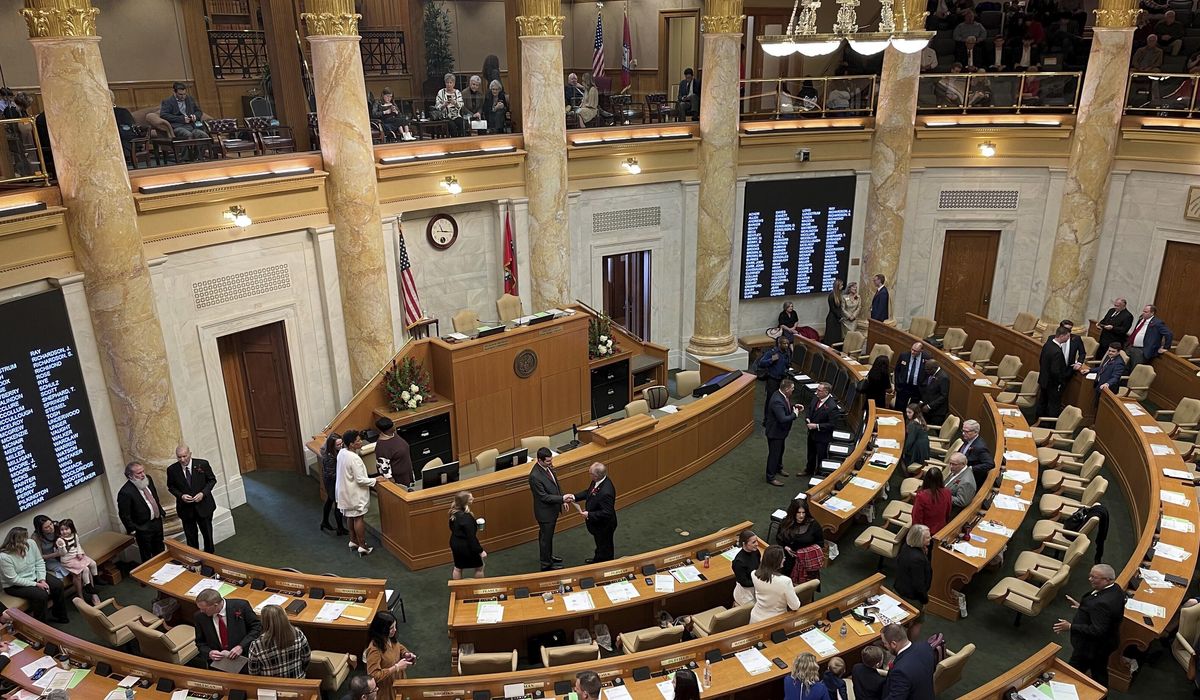


The University of Arkansas at Fayetteville will voluntarily dissolve its diversity, equity and inclusion office as red states move to purge the programs.
The office dedicated to supporting historically underrepresented racial and ethnic minorities on campus will close permanently Aug. 1 as part of a new strategic plan, Chancellor Charles Robinson told the campus in a letter last week.
He said administrators are reassigning DEI staff and funding to support roles in five departments essential to campus recruitment and retention: student success, student affairs, equal opportunity and compliance, university advancement and human resources.
“It is my belief based on my experience … that we can accomplish better outcomes by reallocating resources into these essential areas,” wrote Mr. Robinson, the school’s first Black chancellor and a former vice chancellor for diversity.
Mr. Robinson insisted that the DEI office is not closing in response to political pressure. According to officials at the public campus, decentralizing DEI resources will bolster diverse student success and faculty recruitment.
“While as a state institution, we are always respectful of the laws, regulations, and various viewpoints on how we carry out our mission, from an educational standpoint and as an employer, we believe that this is the best way to fulfill our land-grant mission of access and opportunity for all,” John Thomas, a university spokesperson, told The Washington Times.
Closing the DEI office responds to “the general political climate” moving away from making diversity “the responsibility of a single person or office,” said Stephen Caldwell, a music professor who chairs the Faculty Senate.
“Politics are always involved, even if we don’t like to admit it,” Mr. Caldwell told The Times. “I don’t see this as getting rid of DEI in any way, but as expanding it and increasing the access to it. Diversity is now the responsibility of everybody.”
Arkansas would be the first public university in the country to dismantle its DEI office without a mandate from its board of trustees. Last January, the University of South Dakota replaced its DEI offices with “opportunity centers” in response to direct orders from Republican Gov. Kristi Noem.
Critics have long argued that DEI offices feed a racially divisive culture of special entitlements in higher education, paradoxically making it harder for minorities to succeed academically.
On Wednesday, a conservative higher education group blasted the University of Arkansas’ decision.
“By eliminating the formal DEI office, the university will make it harder for the Legislature to track the expense of DEI and harder for people to see how heavy-handed and intrusive the DEI ideology really is,” said Peter Wood, president of the conservative National Association of Scholars and a former associate chancellor at Boston University. “The action by the university shows an intent to deceive the public and to avoid accountability.”
Other academics agreed with Mr. Robinson, the chancellor, that it’s better to distribute multicultural employees throughout institutions rather than segregate them in a separate office.
“The best thing we could do to promote equity and inclusion in higher education would be to provide more tutoring and other academic support to first-generation and minority students, who often arrive with less adequate preparation,” said Jonathan Zimmerman, a professor in the history of education at the University of Pennsylvania. “If dollars are reallocated to those services, they will do more to enhance DEI than diversity trainings, bias response teams and the other kinds of interventions these offices have created.”
Republican-led Florida, Texas and Ohio have passed laws this year requiring public colleges and universities to shutter DEI offices.
In Iowa, calls to pause or re-evaluable DEI spending have come from the state university system’s governing board.
At the federal level, Sen. Marco Rubio, Florida Republican, has introduced a bill that would block accrediting agencies from considering DEI and affirmative action policies in the accreditation process. It is unlikely to pass the Democrat-controlled Senate.
No bills targeting collegiate DEI programs are pending in the Arkansas state Legislature. But GOP lawmakers have floated several proposals targeting racial preferences.
Earlier this year, a proposed ban on affirmative action in state and local agencies failed in the Arkansas House of Representatives after passing the state Senate. Both legislative chambers and the governor’s mansion are under Republican control.
Diversity, equity and inclusion offices arose decades ago from corporate diversity programs. Experts say the number of offices has soared since 2014 amid high-profile protests against police violence toward minorities, expanding from the private sector into public education at all levels.
The offices have become indispensable to public educators from the kindergarten to university levels, according to some DEI experts.
“Objectively, DEI was founded to support populations who are marginalized and previously excluded from mainstream policy-making, systems, and structures,” said Darryl Diggs, director of equity teaching and learning for the Special School District of St. Louis. “Over the past few years, people were hired and empowered to tackle this question. Now, with the hint of dissolution, who will stand in the gap?”
• Sean Salai can be reached at ssalai@washingtontimes.com.
